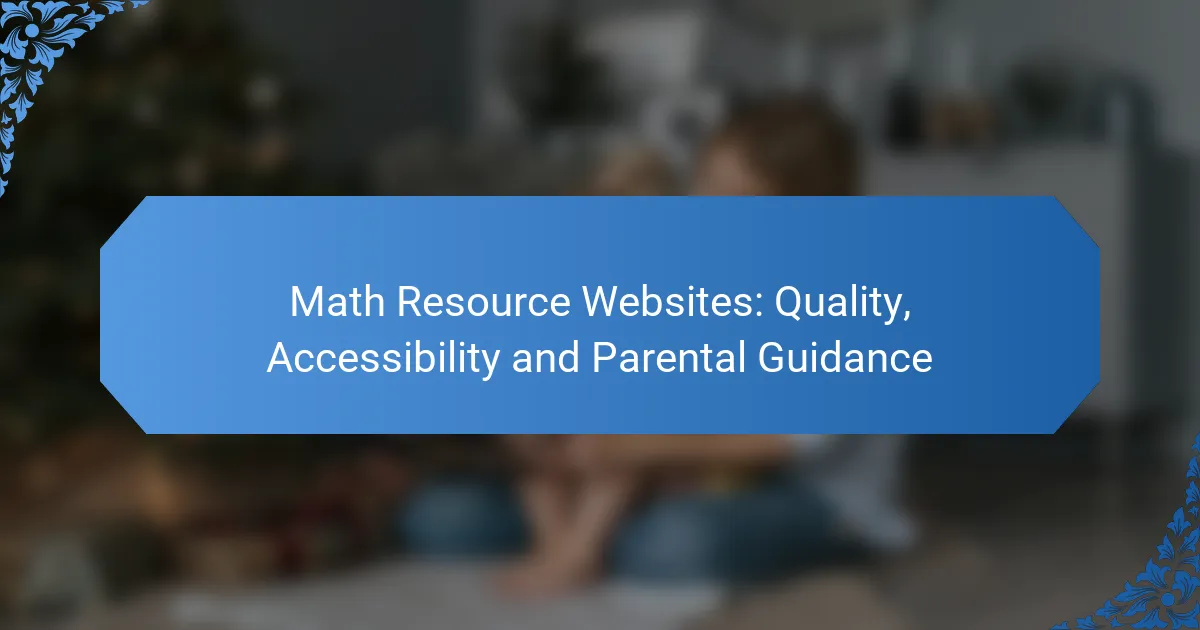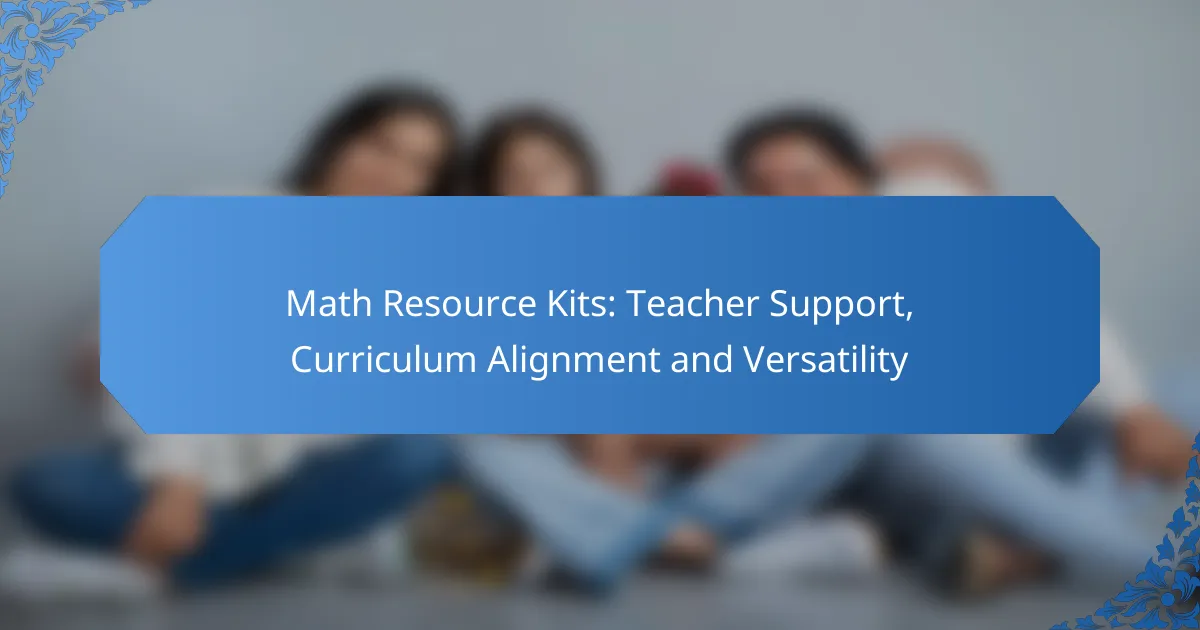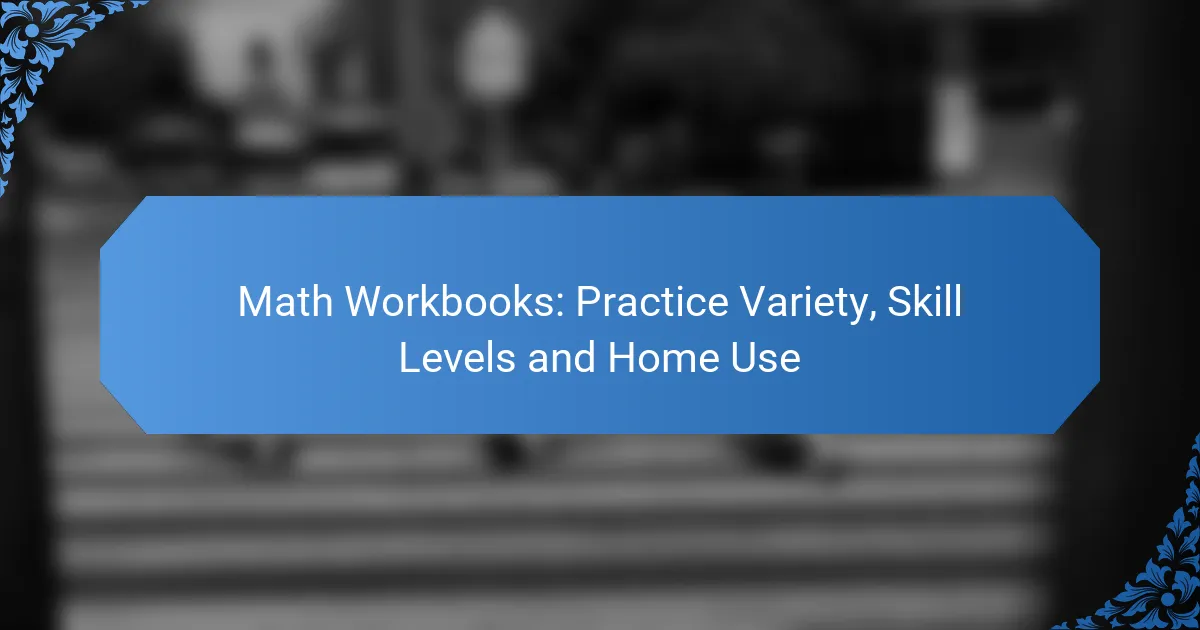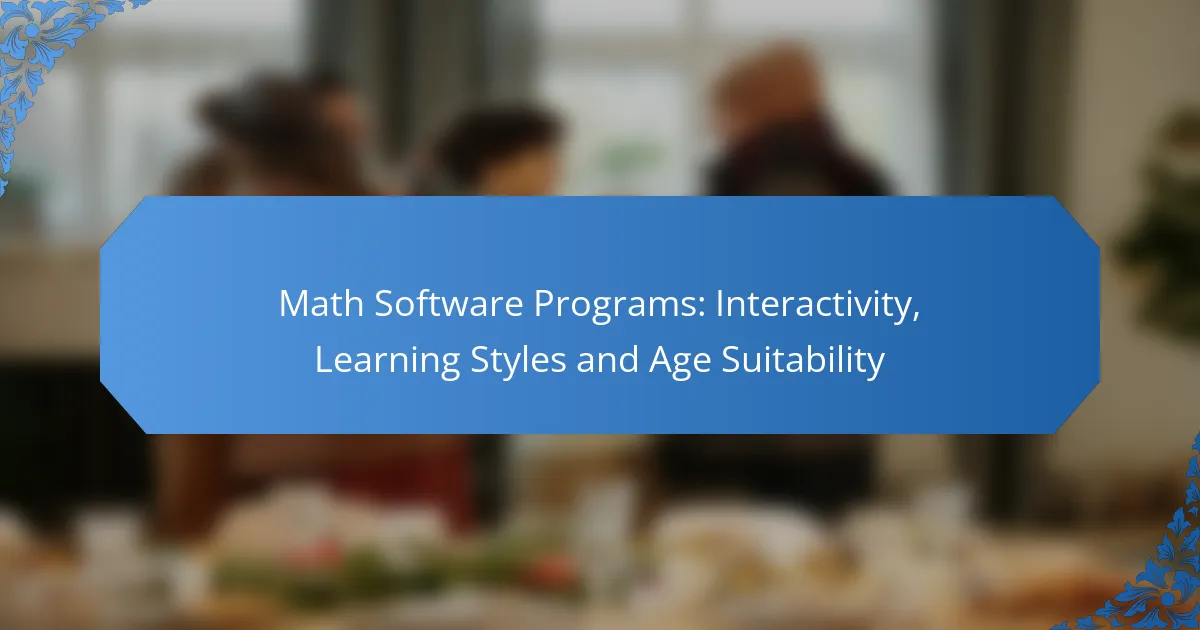Math resource websites serve as valuable tools for parents looking to enhance their children’s learning experience at home. By offering engaging content, interactive exercises, and progress tracking, these platforms cater to various learning styles and needs. Parents can focus on quality resources that ensure accessibility and provide necessary controls to support their child’s educational journey.

What Are the Best Math Resource Websites for Parents?
The best math resource websites for parents provide engaging, interactive content that supports children’s learning at home. These platforms often offer a variety of tools, including practice exercises, instructional videos, and progress tracking to help parents guide their children effectively.
Khan Academy
Khan Academy is a free online platform that offers comprehensive math resources for students of all ages. It features instructional videos, practice exercises, and personalized learning dashboards that allow parents to track their child’s progress.
Parents can encourage their children to explore topics at their own pace, making it suitable for both struggling learners and those seeking advanced challenges. The platform covers a wide range of math topics, from basic arithmetic to calculus.
IXL
IXL is a subscription-based service that provides a personalized learning experience in math and other subjects. It offers thousands of practice questions that adapt to the child’s skill level, ensuring they are always challenged appropriately.
Parents can monitor their child’s performance through detailed reports, making it easier to identify areas needing improvement. IXL also aligns with educational standards, which can be beneficial for parents looking to support their child’s school curriculum.
Mathway
Mathway is a versatile tool that helps students solve math problems across various topics, from basic algebra to complex calculus. It allows users to input problems and receive step-by-step solutions, which can enhance understanding.
While Mathway is free for basic use, a subscription is required for full access to its features. Parents should guide their children to use it as a learning aid rather than a shortcut to answers, promoting a deeper grasp of mathematical concepts.
Prodigy Math
Prodigy Math is a game-based learning platform that engages students through interactive math challenges. It is designed for children in grades 1-8 and aligns with common core standards, making it a useful supplement to classroom learning.
Parents can create accounts to monitor their child’s progress and customize learning paths. The gamified approach keeps students motivated, but parents should ensure that gameplay does not overshadow actual learning.
Mathletics
Mathletics is an online math program that combines curriculum-aligned content with engaging activities and competitions. It is suitable for students from early years to secondary school and offers a variety of resources to support different learning styles.
Parents can track their child’s progress through detailed reports and encourage them to participate in live math challenges. Mathletics requires a subscription, so it’s essential to evaluate whether its features align with the child’s learning needs before committing.
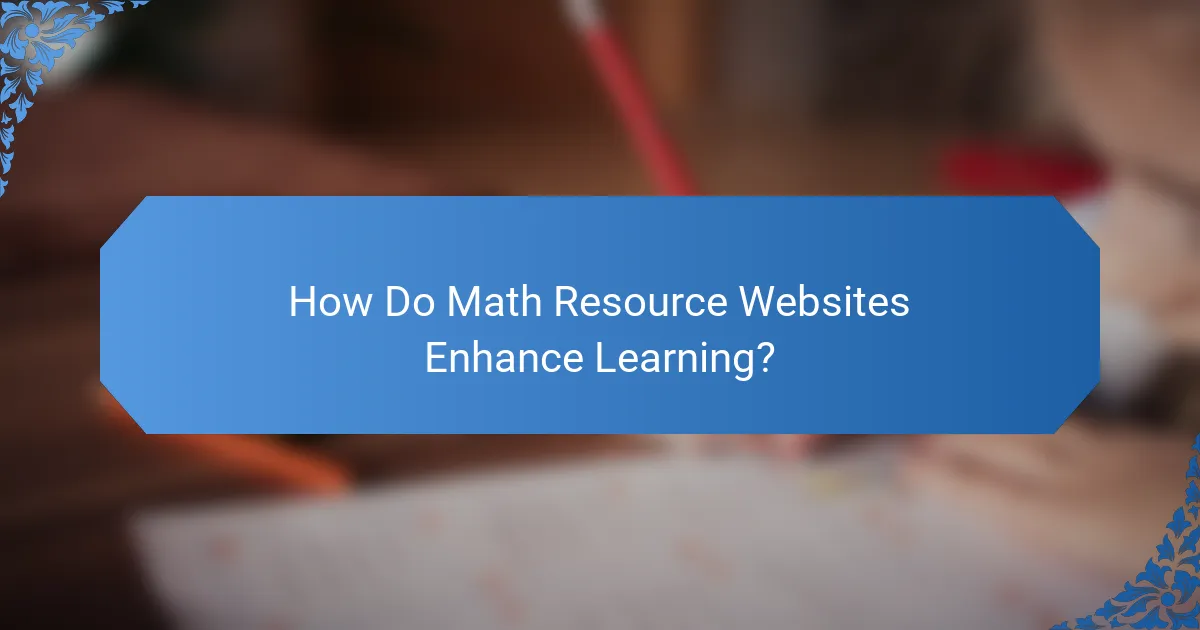
How Do Math Resource Websites Enhance Learning?
Math resource websites enhance learning by providing interactive tools, personalized experiences, and progress tracking features. These elements create an engaging environment that caters to individual learning styles and helps students grasp mathematical concepts more effectively.
Interactive exercises
Interactive exercises on math resource websites allow students to practice problems in a dynamic way. These exercises often include instant feedback, which helps learners identify mistakes and understand concepts better. For example, platforms may offer drag-and-drop activities or gamified quizzes that make learning enjoyable.
When using interactive exercises, ensure that they align with your child’s curriculum to reinforce what they are learning in school. Look for websites that provide a variety of problem types, from basic arithmetic to complex algebra, to cater to different skill levels.
Personalized learning paths
Personalized learning paths tailor educational content to meet individual student needs. Many math resource websites assess a learner’s current level and adapt the difficulty of exercises accordingly. This customization helps students progress at their own pace, ensuring they master foundational concepts before moving on to more advanced topics.
To maximize the benefits of personalized learning paths, encourage your child to engage regularly with the platform. Consistent practice can lead to significant improvements in understanding and retention of mathematical concepts.
Progress tracking
Progress tracking features on math resource websites provide insights into a student’s learning journey. These tools often display metrics such as completed exercises, scores, and areas needing improvement. This information can help parents and educators identify strengths and weaknesses in a child’s understanding of math.
When using progress tracking, set specific goals with your child, such as completing a certain number of exercises each week. Regularly reviewing progress together can motivate your child and help them stay accountable for their learning.

What Features Should Parents Look for in Math Resource Websites?
Parents should prioritize features that enhance learning, ensure accessibility, and provide control over content. Key aspects include the quality of educational materials, options for different learning needs, and parental controls to monitor usage.
Quality of content
High-quality content is essential for effective learning. Look for websites that offer materials aligned with educational standards, such as Common Core or state-specific guidelines. Resources should include a variety of formats, such as interactive exercises, video tutorials, and practice problems.
Additionally, check for regular updates and a range of topics that cover different grade levels. Websites that provide assessments or progress tracking can help parents gauge their child’s understanding and areas needing improvement.
Accessibility options
Accessibility is crucial for ensuring all students can benefit from math resources. Websites should offer features like text-to-speech, adjustable font sizes, and color contrast settings to accommodate different learning styles and needs.
Consider platforms that provide multilingual support or resources tailored for students with disabilities. This inclusivity allows parents to find suitable materials for their children, regardless of their specific requirements.
Parental controls
Parental controls enable parents to manage their child’s online learning experience effectively. Look for websites that allow you to set time limits, restrict access to certain content, and monitor usage patterns.
Some platforms offer detailed reports on progress and engagement, helping parents stay informed about their child’s learning journey. Choose resources that empower parents to customize the learning environment while ensuring safety and appropriateness of content.
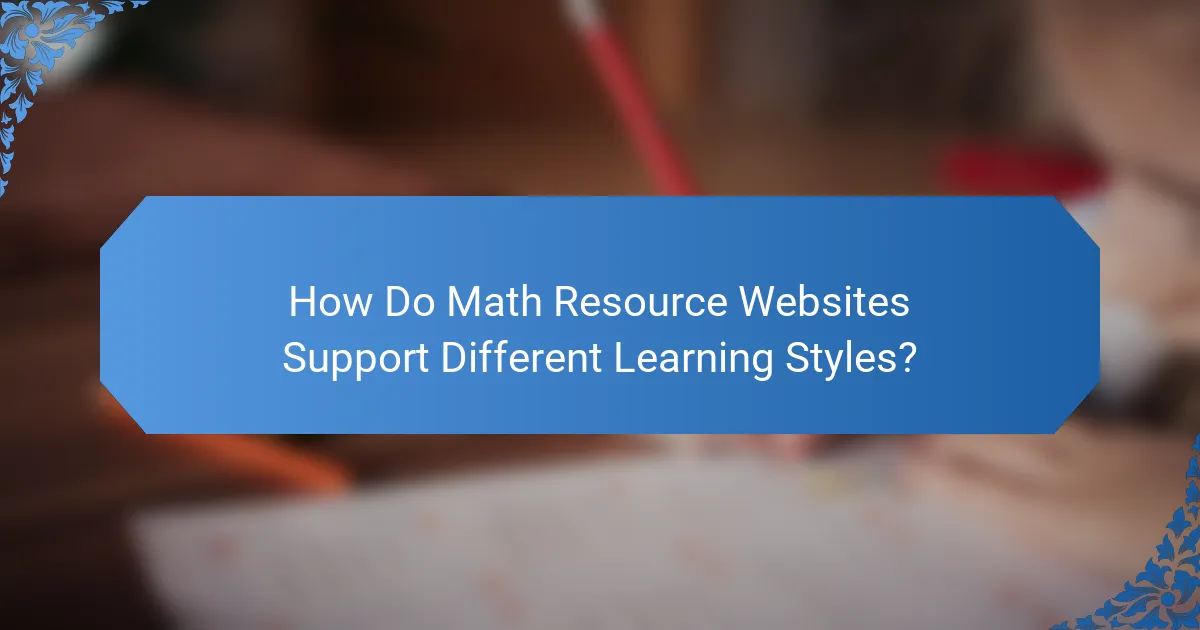
How Do Math Resource Websites Support Different Learning Styles?
Math resource websites cater to various learning styles by providing diverse tools and materials that accommodate visual, auditory, and kinesthetic learners. These platforms enhance understanding and retention by aligning with individual preferences in how information is processed.
Visual learning tools
Visual learning tools include videos, infographics, and interactive simulations that help learners grasp mathematical concepts through imagery. For instance, a video explaining geometric shapes can make abstract ideas more tangible by showing real-world applications.
Many math websites offer color-coded diagrams and charts that simplify complex data, making it easier for visual learners to identify patterns and relationships. Using these tools can significantly enhance comprehension and retention of mathematical principles.
Auditory resources
Auditory resources, such as podcasts and recorded lectures, provide explanations and discussions that cater to learners who absorb information through listening. Websites may offer audio lessons that break down topics into manageable segments, allowing learners to engage with the material at their own pace.
Incorporating auditory resources into study routines can be beneficial, especially when combined with visual aids. For example, listening to a math concept while following along with a visual representation can reinforce understanding and improve recall.
Kinesthetic activities
Kinesthetic activities involve hands-on learning experiences that engage learners physically. Math resource websites often provide interactive games and challenges that require users to manipulate objects or solve problems in a tactile way, which can enhance engagement and understanding.
Examples of kinesthetic activities include virtual math labs where students can experiment with equations or use manipulatives to visualize problems. These activities are particularly effective for learners who thrive on movement and direct interaction with the material.

What Are the Costs of Popular Math Resource Websites?
The costs of popular math resource websites vary significantly, with many offering free access while others may charge subscription fees. Understanding these costs can help parents choose the best resources for their children’s learning needs.
Khan Academy (free)
Khan Academy is a widely recognized platform that provides free educational resources, including math tutorials and practice exercises. Users can access a vast library of instructional videos and interactive problems without any financial commitment.
The platform operates on a donation model, which allows it to remain free for users. This accessibility makes it an excellent choice for families looking for quality math resources without incurring costs.
Parents should encourage their children to create an account to track progress and earn badges for completed tasks. This feature can motivate students and help them stay engaged with their math studies.
